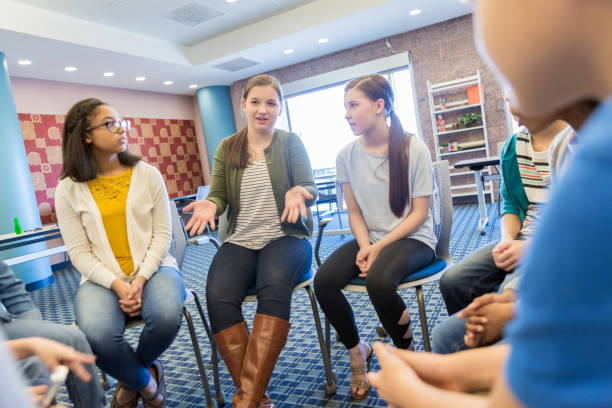Triumphant Teens – Girls Group
This empowerment group will focus on life skills, communication, positive body image, higher self-esteem, substance use prevention, healthy relationships with peers and family, and emotion regulation. Therapy approaches will be DBT, CBT, and Mindfulness, while incorporating creative interventions.
Details:
This is a Virtual Group
Who: ALL girls ages 14-18 (still in high school)
When: Tuesday nights, 5:30 pm-6:45 pm, beginning Jan. 17th
How [much]: $100/intake with parent, $80/session (sliding scale available)
Contact: support@matonecounseling.com to learn more or to get signed up!
Facilitator: Kim Matone, LCMHC, Co-Owner
Kim has a passion for working with teen girls and women. For her entire career, Kim has counseled or facilitated groups on substance use, bullying, safe dating, empowerment, and codependency. She will be assisted by interns, Alex Washburn and Shannon Marshall.

Teen Mental Health Concerns and COVID-19
Teen mental health has long been a topic of concern as trends in research have shown an increase in mental health symptoms and risk factors throughout the 2000’s, particularly in girls (Keyes et al., 2019). In the wake of COVID19, data has suggested that the pandemic has worsened mental health symptoms for many adolescents. Teens have reported feeling unable to cope with stressors and strained relationships exacerbated by the pandemic and 25% of teens reported an increase in negative emotional and mental health symptoms during the pandemic and disconnection from classmates. In addition, many parents have faced the difficulties of income uncertainty, health concerns, and balancing work and childcare throughout the pandemic which can lead to increased mental health symptoms and can adversely impact adolescent mental health (Panchal et al., 2021).
Teen years are already a time of transition, social and academic pressure, and physical and emotional development. Considering the extra pressures brought on by the pandemic including social isolation, school closures, family loss, and financial difficulties, teens are facing increased stressors in a developmentally challenging time in their lives. Adolescence is a key period of brain development including the regions of the brain related to emotional regulation. Brain development can be shaped by physical and psychosocial experiences during adolescence which can create long lasting impacts on mental health. It is a particularly sensitive time in which synapsis in the teen brain can change greatly in reaction to social, emotional, and cognitive shaping experiences. It is in this time that complex functions in the brain such as working memory, impulse control, planning, etc. are maturing. This leaves the adolescent brain vulnerable to influences that can cause shifts in their brain chemistry impacting mental and emotional health (Dow-Edwards et al., 2019).
Even before the pandemic BIPOC and LGBTQ+ teens faced higher rates of mental illness and barriers to accessing mental health care. Existing systemic inequities including structural racism, poverty, and gender violence, all of which contribute to mental health symptoms, have been exacerbated throughout the pandemic. While none of these inequities are new, it is critical that we address them in the context of mental health and the pandemic. Considering the socioeconomic shifts associated with COVID19, existing issues in access to mental health care for marginalized populations have only increased and the need for comprehensive services that address this gap is consistently growing. Additionally, Black and Latinx households faced COVID19 related illnesses and death at higher rates impacting levels of grief, trauma, and financial hardship that can all contribute to mental health symptoms in adolescents. Before the pandemic it was already difficult for many adolescents to receive adequate mental health care due to limited access to providers, financial concerns, and lack of insurance coverage. While providers have attempted to meet the demand for adolescent mental health services, the increased need for these critical services due to the pandemic has remained intact (Panchal et al., 2021).
As mental health symptoms of sadness, hopelessness, anxiety, and suicidality increase among teen girls and access to mental health resources remain limited, teens and parents of teens are often left at a loss for how to regain support and build emotional health. Social isolation due to the pandemic disrupted many adolescents’ ability to access to social support which acts as a protective factor from mental illness. Additionally, the length of time a teen spends in isolation is correlated to mental health concerns later in life. Research suggests that high school students who were able to maintain feelings of connectedness with other peers and adults even during the isolation of COVID19 have reduced mental health symptoms in comparison with those who were not able to maintain feelings of connectedness. Engagement in mental health services that foster social support can provide a buffer of resilience to adolescents during this time. It is critical that we address the mental health needs of teen girls as impacts from the pandemic may have long-term consequences for their well-being (Jones et al., 2022).
While the pandemic has exacerbated mental health symptoms and limited access to resources, there are still many ways that parents and teens can build on positive social and emotional growth. Parents can offer support to their teen girls by:
- Supporting engagement in their community/school
- Modeling social connectedness in their own lives
- Helping teens build positive communication skills with peers and adults
- Remaining compassionate and open when observing teen mental health symptoms
- Identifying and pointing out strengths in their teens (eg. assertiveness, determination, gentleness, thoughtfulness)
- Modeling emotional regulation as teens develop their own ability to regulate
- Encouraging mental health services as needed
At Matone Counseling and Testing it is our job to respond to the prevalent need for connectedness and emotional health among adolescents with comprehensive mental health services. One way that we aim to provide support for teen girls specifically in the upcoming year is through group therapy services starting on January 17th, 2023. We will be offering an 8-week long, trans-inclusive, teen girls empowerment group, Triumphant Teens! This group will focus on emotional and cognitive health and will include topics such as:
- Emotion Regulation
- Higher Self-Esteem
- Positive Body Image
- Healthy Relationships with Peers and Family
- Substance Use Prevention
Therapy approaches will include various creative interventions including DBT, CBT, and Mindfulness. This group format will foster connectedness and healing within a social context that teen girls need at even higher rates due to pandemic isolation.
Dialectical Behavior Therapy (DBT), Cognitive Behavior Therapy (CBT), and Mindfulness interventions are each evidenced based modalities that can increase emotional regulation, well-being, and life satisfaction among adolescents. Using these techniques, teens can learn to recognize unhelpful thought patterns and action and learn to integrate more adaptive coping strategies into their daily lives to increase emotion regulation. Techniques used in these models can also provide teens with strategies to build on self-compassion, self-awareness, and interpersonal awareness to increase psychological resilience. Within the group therapy setting, teens will be able to practice adaptive coping strategies and communication skills with peers and group therapists in real time. This experiential style of learning can allow for effective integration into teen girls’ interpersonal relationships. If you know a teen girl who might benefit from group therapy, find more details about Triumphant Teens!
References:
Dow-Edwards, D., MacMaster, F. P., Peterson, B. S., Niesink, R., Andersen, S., & Braams, B. R. (2019). Experience during adolescence shapes brain development: From synapses and networks to normal and pathological behavior. Neurotoxicology and Teratology, 76, 106834. https://doi.org/10.1016/j.ntt.2019.106834
Jones, S. E., Ethier, K. A., Hertz, M., DeGue, S., Le, V. D., Thornton, J., Lim, C., Dittus, P. J., & Geda, S. (2022). Mental health, suicidality, and connectedness among high school students during the COVID-19 pandemic — adolescent behaviors and experiences survey, United States, January–June 2021. MMWR Supplements, 71(3), 16–21. https://doi.org/10.15585/mmwr.su7103a3
Keyes, K. M., Gary, D., O’Malley, P. M., Hamilton, A., & Schulenberg, J. (2019). Recent increases in depressive symptoms among US adolescents: Trends from 1991 to 2018. Social Psychiatry and Psychiatric Epidemiology, 54(8), 987–996. https://doi.org/10.1007/s00127-019-01697-8
Panchal, N., Kamal, R., Cox, C., Garfield, R., & Chidambaram, P. (2021, May 25). Mental health and substance use considerations among children during the covid-19 pandemic. KFF. Retrieved November 12, 2022, from https://www.kff.org/coronavirus-covid-19/issue-brief/mental-health-and-substance-use-considerations-among-children-during-the-covid-19-pandemic/
South Charlotte NC
South Asheville NC
Online Counseling by Video, Phone & In-Person
Central Asheville NC
Online Counseling by Video, Phone & In-Person
Plenty of Free Parking



